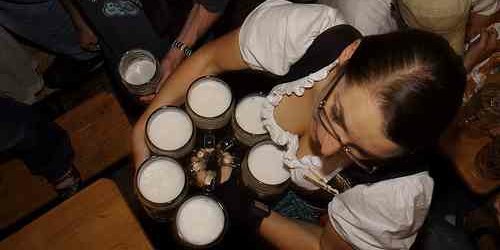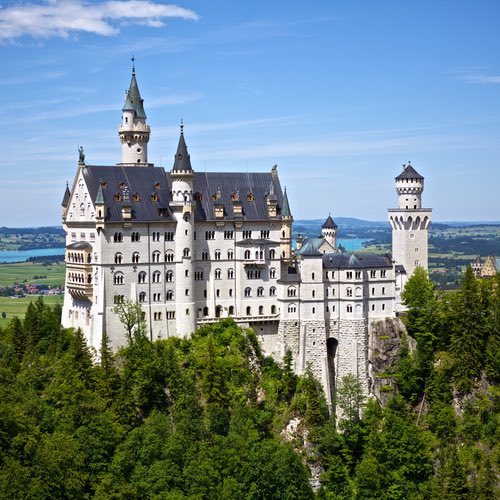Oktoberfest, the world’s third-largest beer consumption per capita, and even a beer law – as you would have guessed, beer is a vital component of German culture. So if you’re planning a trip to Germany, be sure to sample some of the local beers, and enjoy some of the traditions around beer!
Some beer facts to get you started:
Germany’s beer consumption per capita is the third-largest in the world, after the Czech Republic and Ireland. So on average, every German drinks 110 liters of beer every year! The US is back in 13th place with a modest 81 liters.
- Some 1300 breweries in Germany are producing over 5000 brands of beer, with over half of the breweries located in the southern German state of Bavaria.
- The alcohol content of German beers is usually between 4.7% and 5.4% for most traditional brews, while the alcohol content of Bockbier or Doppelbock (double Bockbier) can rise up to16%, which is stronger than many wines.
- The Oktoberfest, held in Munich every year from late September to the first weekend in October, is the world’s largest beer festival. Only beer brewed within the city limits of Munich (Oktoberfest Beer) is allowed to be served. Around 7-8 million liters are consumed each year during the 16-day festival.
The German Beer Purity Law (Reinheitsgebot)
There are a lot of laws in Germany, so it might not come as a surprise that there is one about beer as well. The German Beer Purity Law or Reinheitsgebot is the world’s oldest food safety law that is still valid. It regulates the ingredients and was introduced in Bavaria in 1516. The Beer Purity Law stipulates that only barley, hops, and water may be used for beer brewing – yeast had not yet been discovered. It later became the fourth legal ingredient.
In modern times, the law is part of the German tax code and states that, in bottom-fermented beers (lagers), only barley malt, hops, yeast, and water may be used. Lagers brewed in Germany may not contain spices, corn, rice, sugar, un-malted grains, chemical additives, and stabilizers. The original law, which also included that beer not brewed according to the Purity Law could not be sold in Germany, was abolished in 1987 when the European Court ruled that its narrow list of ingredients was a restraint of free trade.
Since the ruling, it has been legal to import beers into Germany that are brewed with adjuncts (sugar, corn, rice, non-malted grains) and treated with chemicals for an artificial head and a longer shelf life. German brewers, however, still adhere fiercely to the Reinheitsgebot as a matter of pride and tradition. When Beck’s Brewery, one of Germany’s five largest breweries, was sold to Belgium-based Interbrew (now Anheuser Busch In-Bev, the world’s largest brewery by volume) there were fears that the traditional Beck’s beer would be “contaminated” with non-Purity Law conforming ingredients. However, the recipe for Beck’s beer has remained unchanged, and it continues to be Germany’s top-selling export beer.
Types of German beer
There is a large selection of beers in Germany, many of which are locally brewed and often not available outside the area. If you know what type of beer you prefer, this gives you a good starting point:
You almost can’t go wrong with ordering a Pils /Pilsener or a Hefeweizen. Pils is a light lager with a more prominent hop taste, while Hefeweizen is an unfiltered wheat beer with a yeast base.
Weizenbier and Weissbier (mostly spelled Weißbier) are the standard names for wheat beer. You can just order one of those and will most likely be presented with the local variety. The very light Berliner Weisse is often mixed with either raspberry or woodruff syrup (“Berliner Weisse mit Schuss”) and makes a great summer drink.
Some other popular lager beer types are Export (Dortmund region), Helles (Bavaria), Bock (an amber-bodied, slightly bitter lager) as well as Kölsch (Cologne region) and Alt (Düsseldorf region). Don’t confuse the latter two! The neighboring cities of Cologne (Köln in German) and Düsseldorf are in a long-standing more-hate-than-love relationship, and you don’t want to ruffle any feathers by ordering the wrong beer in the wrong town…
The lovers of darker beers have the choice between Schwarzbier (fermented dark lager with a roasty taste), Dunkles (similar to the more sweet Munich variety, and the more hoppy Franconian version, both Bavaria) or Rauchbier, a specialty of the Bavarian town of Bamberg. Furthermore, there is Kellerbier (cellar beer), unfiltered lagers similar to cask ales.
Mixing drinks – beer-based
While Germans prefer their beer itself to be brewed to the highest purity standards, there is a long tradition of mixing the finished product. The most popular, Radler, is a Shandy with about 50% beer (any) and 50% German style sparkling lemon soda. It is known for being thirst-quenching and most popular in summer, but you can get it all year round – even pre-mixed in bottles or cans. Another popular beer mixed drink is beer and coke (“Diesel”), plus there are numerous other variations.
German beer brands
The largest: Krombacher (most consumed Pils in Germany, Krombacher Pils), Bitburger (also Pils), Warsteiner (product range: Hefeweizen, Pils, dark lager, alcohol-free), Beck’s (large product range).
Ordering your German beer
Now you’re ready to talk the talk. To begin, it will behoove you to learn German phrases commonly heard in a German pub.
“Bitte ein Pils” or “Ein Pils, bitte” – A Pils please – likely to get you a decent beer in most places. Replace Pils with the beer of your choice.
“Ich hätte gerne ein Bier” – I would like to have a beer
“Ein alkoholfreies Bier, bitte” – ordering alcohol free beer, available almost anywhere
When you raise your glass, you say “Prost”, or, mostly in Bavaria, “Zum Wohl” – and don’t forget to clink your glasses together, this is called “anstoßen”.
Enjoy your beer!
Sibylle Bernardakis (but not the Amateur Traveler) was sponsored to write this post by Pimsleur which provides resources to learn German and 50+ other languages.
- Book Your Accommodation HERE
- Buy Travel Insurance
- Get a Car Rental
- Get a universal plug adapter
- Search for Great Tours HERE
- Get an eSim to be able to use your smartphone abroad.


 Road Trip through Bavaria in Southern Germany
Road Trip through Bavaria in Southern Germany The Smiles of Carnival in Düsseldorf, Germany
The Smiles of Carnival in Düsseldorf, Germany 13 Places to Visit in Germany other than Berlin and Münich
13 Places to Visit in Germany other than Berlin and Münich Driving in Germany as a Tourist – German Road Signs and 12 Others Things to Know
Driving in Germany as a Tourist – German Road Signs and 12 Others Things to Know

Jeremy Branham
Says:February 8th, 2012 at 8:25 am
One of the best, simple overviews I’ve ever read on German beer! 🙂
Amanda
Says:February 9th, 2012 at 12:33 pm
Awesome, concise overview! Well done.
fotoeins | Henry
Says:February 9th, 2012 at 5:17 pm
Covered my three go-to beer: Hefeweizen, Kölsch, und Rauchbier!
As Jeremy above states, the writer does a great job providing a concise overview of the modern state of beer in Germany.
I’d like to add:
* in Germany, don’t forget to look at everyone in the eye while clinking beer classes. Spilling full mugs of beer is okay, so long as you give everyone the “evil eye”. 😉
* if there’s only a few kinds of beer available at the tent/pub, or if you’ve been ordering the same kind all night, you can call up an attendant, point to your empty mug, and say “nochmal, bitte” (another one, please).
Andrew
Says:February 11th, 2012 at 2:16 pm
A good read as a general overview to German beers.
A few things I notice though… Dunkeles is just the word for dark. There are dark beers from many breweries, not just near Munich. Often you can even find a Dark Weizen. I
Export is also one I don’t associate with Dortmund. I have seen Export class beers from all kinds of breweries, usually with a higher alcohol content than the locals.
Radler is indeed a great summer drink. You can also order “Saueres Radler” Sour Radler, which is fizzy water instead of soda. I find adding sweet soda changes the taste of the beer, while the mineral water doesn’t have a taste and just adds more bubbles and cuts the kick a bit.
Definitely look for the local breweries and their beer gardens. Find one with a soccer game on and that is the typical German summer afternoon.
fotoeins | Henry
Says:February 12th, 2012 at 2:10 am
OK, with that last post by Andrew, I need summer now, and I need a beer.
STAT!
Linda Wilson
Says:February 27th, 2012 at 10:39 am
Excellent review – I have to admit it made my posts about Austrian Beer look very shallow by comparison. Think I’ll redraft (pun not intended)!